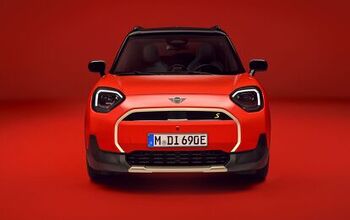As Ford Takes a Hit, Hackett Appeals to Trump to End Trade Disputes

Ford’s decision to construct the current-generation F-150’s body purely of aluminum paid off in terms of lightweighting, fuel economy, and sales, but rising commodity costs over the past couple of years eroded some of the financial benefit. There’s far greater headaches facing Ford these days, as the industry grapples with tariffs on not just imported aluminum and steel, but vehicles as well.
A second income-sucking tariff hit in July, when the U.S. applied an import duty of 25 percent on a slew of Chinese goods, prompting China to up its own tariffs on American goods, including automobiles. Ford isn’t having it. Having already lost $1 billion in profit, CEO Jim Hackett has a message for President Trump.
If the U.S. doesn’t resolve its trade disputes in a hurry, expect Ford to suffer even more, Hackett claimed.
In an interview with Bloomberg, the CEO said, “The metals tariffs took about $1 billion in profit from us — and the irony is we source most of that in the U.S. today anyways.” He added, “If it goes on longer, there will be more damage.”
Ford sources 95 percent of its steel from U.S. producers and suppliers, with 98 percent of the company’s aluminum bought from domestic sources.
As we reported earlier this week, Ford Motor Company sales in China dropped 36 percent in August. The same month, tariffs kiboshed Ford’s plan to bring the China-built Ford Focus Active to the U.S., depriving American buyers of the only small, car-like vehicle in the automaker’s future product pipeline.
Meanwhile, the company’s struggling European division stands to lose out, and perhaps never get back on its feet, if Trump boosts tariffs on European Union-built vehicles. The president threatened punitive tariffs on Europe-sourced vehicles in response to an existing 10-percent tariff levied on U.S. cars. While the EU signalled it might be okay with the dropping of all auto tariffs, that olive branch went nowhere.
“What we’re urging our administration to do — where we’re in China and in Europe — we say, you need to come to agreement quickly,” Hackett told Bloomberg.
Besides negatively impacting Ford’s profit (analysts predict a 29 percent slump for 2018), the trade dispute certainly hasn’t given investors newfound confidence in the company. Hackett’s taken a lot of heat for the company’s stubbornly depressed stock price, and Moody’s decision last month to downgrade it to near junk status didn’t help one bit. August was a bad month for Ford, and the hurt might be far from over.
[Image: Ford Motor Company]

More by Steph Willems
Latest Car Reviews
Read moreLatest Product Reviews
Read moreRecent Comments
- Slavuta CX5 hands down. Only trunk space, where RAV4 is better.
- Kwik_Shift_Pro4X Oof 😣 for Tesla.https://www.naturalnews.com/2024-05-03-nhtsa-probes-tesla-recall-over-autopilot-concerns.html
- Slavuta Autonomous cars can be used by terrorists.
- W Conrad I'm not afraid of them, but they aren't needed for everyone or everywhere. Long haul and highway driving sure, but in the city, nope.
- Jalop1991 In a manner similar to PHEV being the correct answer, I declare RPVs to be the correct answer here.We're doing it with certain aircraft; why not with cars on the ground, using hardware and tools like Telsa's "FSD" or GM's "SuperCruise" as the base?Take the local Uber driver out of the car, and put him in a professional centralized environment from where he drives me around. The system and the individual car can have awareness as well as gates, but he's responsible for the driving.Put the tech into my car, and let me buy it as needed. I need someone else to drive me home; hit the button and voila, I've hired a driver for the moment. I don't want to drive 11 hours to my vacation spot; hire the remote pilot for that. When I get there, I have my car and he's still at his normal location, piloting cars for other people.The system would allow for driver rest period, like what's required for truckers, so I might end up with multiple people driving me to the coast. I don't care. And they don't have to be physically with me, therefore they can be way cheaper.Charge taxi-type per-mile rates. For long drives, offer per-trip rates. Offer subscriptions, including miles/hours. Whatever.(And for grins, dress the remote pilots all as Johnnie.)Start this out with big rigs. Take the trucker away from the long haul driving, and let him be there for emergencies and the short haul parts of the trip.And in a manner similar to PHEVs being discredited, I fully expect to be razzed for this brilliant idea (not unlike how Alan Kay wasn't recognized until many many years later for his Dynabook vision).


































Comments
Join the conversation
Ummm vote democrat? You elect an idiot you get idiotic policies...
Since WW2 America's been taking it in the shorts trade-wise, with most of the world. Europe and the UK were in deep economic trouble after the war....so was Japan. The government gave them all "a hand up" with trade agreements that were very beneficial to them....not so much for us. China fell into the, "emerging" nation category....they also got trade agreements that were more beneficial to them, than us. Time to "level the playing field." Gonna hurt some companies....many customers....but in the long run....fairness will win out. Ford....don't contribute to global whining.